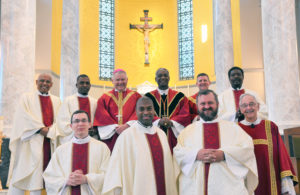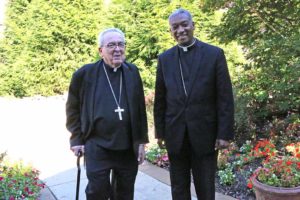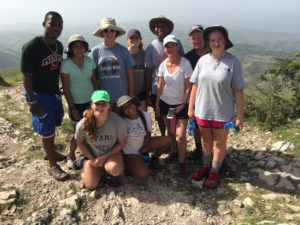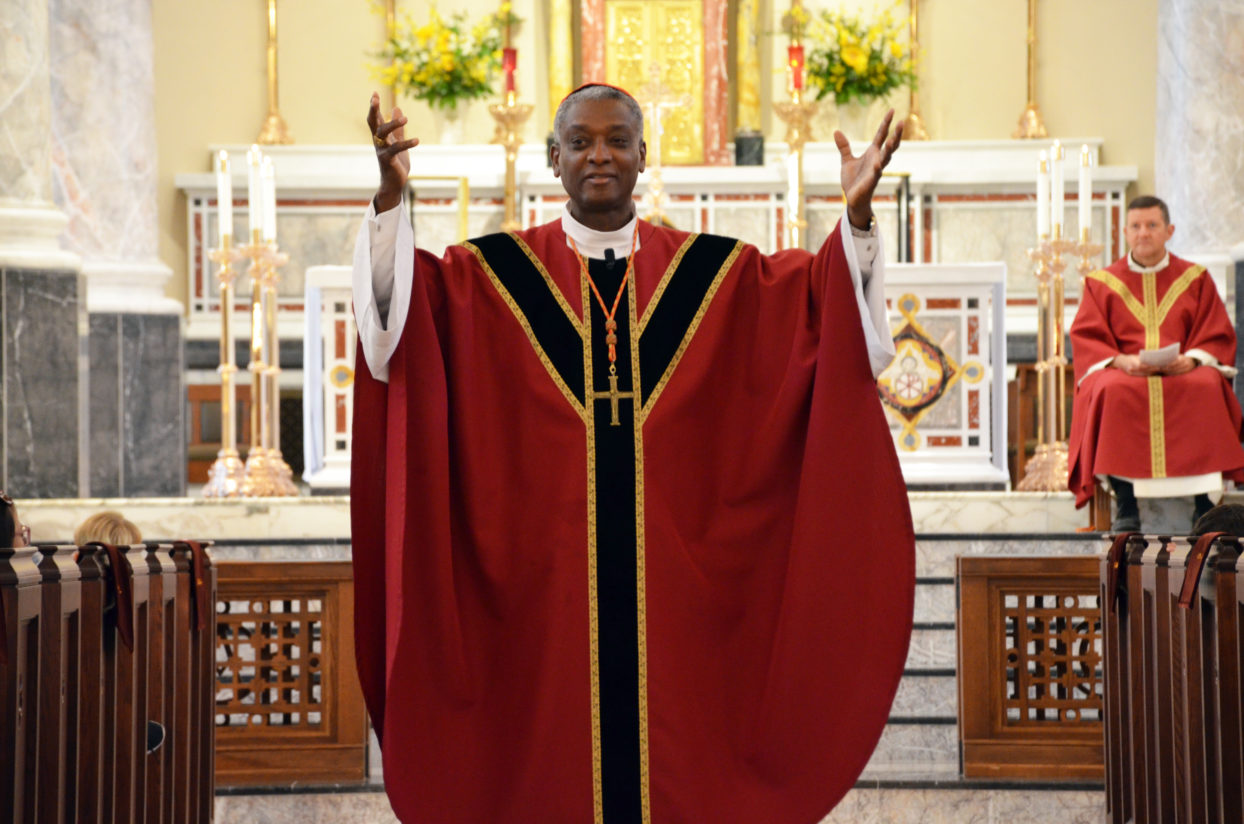Haitian Cardinal Chibly Langlois visits cathedral campus, appeals to supporters to continue their mission
By Bill Brewer
When you can’t get to Haiti, Haiti will get to you.
And so it was at the Cathedral of the Most Sacred Heart of Jesus Oct. 17-18 when Cardinal Chibly Langlois, bishop of Les Cayes in Haiti, visited, celebrating Mass for Sacred Heart Cathedral School students and delivering the keynote address at an Oct. 18 banquet marking the 20th anniversary of Sacred Heart’s Haiti Outreach ministry.
Cardinal Langlois wanted to personally thank the Sacred Heart community for its two-decade support of Haiti. He encouraged the community to continue supporting the small Caribbean nation beset by political and economic strife. The cardinal, who has studied in Rome and has traveled around the world representing Haiti and its needs, is president of the Haitian bishops conference.
Cardinal Langlois was named bishop of Les Cayes in 2011, and in 2014 Pope Francis elevated him to the College of Cardinals.
Scores of diocesan volunteers have donated their time, talents, and money to assist the Boucan-Carré people over the past 20 years, routinely visiting the rural, poverty-stricken area. However, political and social unrest has prevented any Sacred Heart mission trips to Haiti for two years.
Cardinal Langlois celebrated Mass for the students of Sacred Heart Cathedral School and met with Bishop Richard F. Stika, fellow Cardinal Justin Rigali, and cathedral rector Father David Boettner before addressing the Haiti Outreach banquet, attended by about 350 supporters of the Haiti mission.
Welcome to the diocese

Cardinal Chibly Langlois, back row center, celebrated Mass for Sacred Heart Cathedral School students on Oct. 17 at the cathedral. Concelebrating the Mass were: back row from left, Father Edwige Carre, pastor of St. Lawrence Parish in Joelton, Tenn.; Father Michelet Lamarre, pastor of St. Michel Parish in Boucan-Carré, Haiti; Bishop Richard F. Stika; Father David Boettner; and Father Michenet Duportal, former pastor of St. Michel Parish; front row from left, Father Valentin Iurochkin, Father Arthur Torres, Father Martin Gladysz of Sacred Heart Cathedral Parish ,and Sacred Heart Cathedral Deacon Joel Livingston, who assisted.
In welcoming Cardinal Langlois to the Diocese of Knoxville, Bishop Stika remarked how the Haiti Outreach ministry at the cathedral has for the past 20 years served the people of Boucan-Carré, a town outside of the capital city of Port-au-Prince that parishioners early in the ministry identified as the area they wanted to assist.
The bishop noted how the ministry has helped in the construction of school and clinic facilities for Boucan-Carré as well as aid for the people of the area.
“He’s a historic figure. He’s the very first cardinal from Haiti. So it’s a historic visit. Haiti is the poorest country in the world,” said Bishop Stika, who concelebrated with Cardinal Rigali the Sacred Heart School Mass.
Bishop Stika was impressed at how engaging Cardinal Langlois was with the students.
He described the cardinal as very serene and very much aware of the Church around the world, especially in his native country, and Haiti’s need for any assistance other countries can give.
Bishop Stika said Cardinal Langlois is very appreciative of the support Haiti has received from sources such as the Sacred Heart Haiti Outreach ministry.
“For many there, it is the difference in life and death. Haiti has been so damaged by earthquakes, hurricanes; the government is unstable. As a side issue, he (Cardinal Langlois) was unable to go back right away because it was dangerous for him to get to his home diocese. He postponed his return for a few days. The government is really unstable,” Bishop Stika said.
Bishop Stika explained that Cardinal Langlois flew to Tennessee from Rome and visited with two Haitian priests in the Diocese of Nashville. They then drove over to Knoxville, marking Cardinal Langlois’ first visit to the Diocese of Knoxville.
The bishop also pointed out that other parishes, like Immaculate Conception, have Haiti ministries and that Sacred Heart partners with St. Kateri Tekakwitha Parish in Tabb, Va., and St. Anselm Parish in St. Louis in assisting the people of Boucan-Carré.
And for years the Haiti Outreach leaders at Sacred Heart led Knoxville Catholic High School students on mission trips to Boucan-Carré.
Grateful for support

Cardinal Justin Rigali, left, hosts Cardinal Chibly Langlois at the Chancery, where they discussed Haiti and the Church.
In addressing those attending the banquet, which was the key point to his visit, Cardinal Langlois told Cardinal Rigali he was grateful for the time Cardinal Rigali has spent in Haiti. Cardinal Langlois asked for continued prayers for Haiti so that economic and political conditions there will improve.
And he praised the ongoing relationship between the parishioners of Sacred Heart and the people of Haiti.
“Celebrating the 20th anniversary of this partnership, relationship between Sacred Heart and Haiti is a good opportunity to reinforce this relationship with Haiti. At this time I have an opportunity to talk about this relationship. We see and we feel the goodness of this testimony in our Church,” Cardinal Langlois said. “I know here you have many kinds of people: parishioners of Sacred Heart, other parishioners, other people who come from other states, people from other denominations, or non-denominations.
All of you, you are inspired by the Holy Spirit to share what you have, that quality in your life, and that which you receive from God. You want to share.
“In Haiti, we are blessed to have these people since the beginning of the Church, people who go to Haiti to announce the news of God. These missionaries in Haiti, they try to build the Church in Haiti. Seeing the situation of our people in Haiti, they connect their people with our people. They talk to their people, to their families, to their friends to support the mission in Haiti,” the cardinal added. “But now in Haiti, almost all the clergy, all the religious, the laypeople, brothers and sisters, we are a nation in charge of the Church. In the past, when missionaries went to Haiti, they tried to build the Church, build churches, build schools, build clinics, and people expect many things from that and they try to help them. We have testimony from people who were helped by the church, or the school of the church.”
Maintaining the outreach

Students from Knoxville Catholic High School join Sacred Heart Cathedral priest Father Arthur Torres and Sacred Heart parishioner Billy Stair on a mission trip to rural areas of Haiti.
Cardinal Langlois said it is just as important now to continue connecting Haitian people with people from other parts of the world so that the rest of the world can hear of the ways the Catholic Church is reaching out to the Haitian people. He said to build solidarity in Haiti among its people, relationships with people outside Haiti need to be expanded and strengthened.
“We need to connect now our Church and people with other people in order to share our quality and value of life. I know having a relationship and partnership between parishes is a benefit for both communities, a benefit for Haiti and a benefit for you. And you have experienced that in your Haiti mission,” he said.
“We heard about people from United States who go to Haiti, and when they come back to the United States, their lives are changed. Their hearts are opened more to welcome people. They listen better to the mission of the Haitian people, and they further appreciate what they have in their families and in their homes. In Haiti, too, we appreciate when we receive people, not only in sending money, not only in sending goods, we appreciate it when you come and see our country, and stay with us, and try to understand the reality.
“Because when you understand the reality, you can encourage other people to connect to our people. In the Church we know that solidarity always helps. Because with solidarity … hope can grow every day, every year with our people,” he added.
Haiti, with a population of about 11.2 million, is one of the poorest countries in the Western Hemisphere. Approximately 80 percent of its residents live in poverty, according to the CIA World Factbook. The country, which borders the Dominican Republic, also is one of the most densely populated and least developed countries in the Western Hemisphere.
According to the United Nations Development Program, 24.7 percent of Haitians live in extreme poverty, living on less than $1.25 a day. Even more, approximately 59 percent of Haitians, live on less than $2 a day.
“I accepted your invitation to be with you to encourage the committee in charge of this mission. We not only have the committee of Sacred Heart, we have other committees, other missions that have helped our brothers and sisters in Haiti. I want to encourage you to continue. If we didn’t have this kind of partnership, I don’t know where we would find facilities for our schools, to continue to educate our catechists, to continue building clinics, to continue taking care of people. Because within the holy Church, even if you don’t go to Haiti, you are missionaries in Haiti.
“When you make the connection, when you help pay teachers in the schools, or when you help with spiritual activities, you are showing through those activities the charity of the pope, the love of our God. It is the testimony of our faith, the testimony of our charity, of our love. And many people don’t know exactly the sense of this testimony. Because other people can help in education, can help in building some houses. But when you do it because of your faith, because you want to give testimony, because you want to connect people together, because God wants us to be one people—people of God. When you do that for giving this testimony, that means there is this value inside of what you are doing that connects us to our God in heaven,” Cardinal Langlois told the Haiti Outreach ministry supporters.
He thanked those at Sacred Heart and throughout the Diocese of Knoxville who support the Haiti mission for what they have done and for continuing their mission. He also thanked Father Boettner, Bishop Stika, and Cardinal Rigali for their leadership.
Cardinal Langlois explained that in Haiti, the cardinal and the bishops have no salary from the Vatican or local sources. Haitian people have no jobs and so few resources that they can’t financially support the Church unlike in the United States.
“In Haiti, our people don’t have enough jobs to share with us like you are doing here. Many brothers and priests, when they retire, they are like homeless, many of them. In Haiti, we must build the institution, build the parish, build the community in order to involve all the community in what they have to do to grow every day, every month, every year,” he said, emphasizing that in Haiti there are no homes for retired priests and religious. They return to their families with no retirement or pension income. “You are a blessing of God. All of you, and each of you, are a blessing of God. Thank God for you.”
How it helps
The banquet also served as a fundraiser for the Haiti mission, and Father Boettner put into context what the money raised annually goes to.
“When our people first started going to Haiti, Boucan-Carré had no electricity. There was no bridge over the river, and there was very little going on in town. Sometimes we can get discouraged. Is anything getting better? Is anything changing? In the time we’ve been in partnership, in relationship with our brothers and sisters in Haiti, we’ve been able to open an elementary school, a high school, we’ve built a clinic in Bouli, we’ve been able to re-establish the roof over the parish church,” Father Boettner said.
He pointed out that each $150 raised for the Haiti Outreach mission provides a hot meal for a child each day for a year and sends him or her to school for a year.
“But more importantly, what we’ve done is build beautiful relationships with our brothers and sisters in Haiti.
And when you think about the generations of children that have gone to Haiti, that have been impacted by that experience, and that have been formed by those relationships that they continue to maintain in their lives. It has truly made an amazing lifetime impact,” Father Boettner said.
“There’s a great phrase that says if you want to go fast, go alone. Because, obviously, when you’re going by yourself, there’s nobody slowing you down. But if you want to go far, go with another. We want to go far. And we not only want to go far, but we want to continue to go together. So we really need to partner together. Because when we partner together, we recognize those words that Jesus told us: ‘where two or three are gathered in my name, there am I in their midst.’ We believe that there is not only strength in numbers, but the relationships we are building, the partners we have here in East Tennessee, in Virginia, and St. Louis, and also the brothers and sisters we have in Haiti, we are better because of our relationship with each other. We become more fully who God is calling us to be,” he added.
How it all began
Sacred Heart parishioner Billy Stair, who helps lead the Haiti Outreach ministry, told the banquet audience that there have been key moments in the two decades since the Haiti ministry began, such as when parishioners Bob Capps, his wife, Lisa Capps, and Suzy Rowland went to Haiti for the first time in January 1999, traveling to Boucan-Carré in a remote part of Haiti with no electricity, arriving at night with nowhere to stay.
He also credited Deacon Ben Johnston and John Stone for first developing partnerships that allowed the Haiti ministry to succeed and noted the talents of the volunteers who have taken part in the ministry during the past 20 years.
“The mission that we celebrate is due in no small part to those first three volunteers. A primary school and a secondary school with more than 1,100 students and a remote mountain clinic that sees 400 patients a month can trace their origins directly to [Bob Capps, Lisa Capps, Suzy Rowland],” Mr. Stair said. “The things that have happened in Haiti over the last 20 years did not happen by accident. John Stone and Ben Johnston had the good judgement back then to understand that any chance of success depended upon establishing a lasting partnership. It began with a genuine partnership with St. Michel that today is the envy of other programs. John and Ben also recognized that it was important to have partnerships here in America.”
“Although a smaller parish than Sacred Heart, year in and year out St. Kateri (Tekakwitha) Parish near Newport News, Va., has given us more than $50,000 to support our mission. St. Anselm Parish near St. Louis did not provide operating funds. But they built a new primary school, they built a new rectory, they built a new roof for St. Michel,” Mr. Stair continued.
“It’s impossible for those who went on those first missions to realize the potential for those partnerships. Instead of one church trying to go it alone, three churches are pulling together in the same direction for the same mission.”
Mr. Stair spoke of volunteers who built a desperately needed medical clinic in Bouli near Boucan-Carré and also built a school for St. Michel Parish as well as the roof for the St. Michel Parish church.
In addition, he mentioned the teams of medical professionals who have volunteered to treat the Haiti residents, saving lives in many instances. Specifically, he singled out Dr. Dean Mire and Cindy Mire, Jordan Pyda, Dr. Paul Froula, Leslie Adams, Dr. Drew Dirmeyer, Dr. Brian Daley, Dr. Jeff Keenan, Kathleen Edmunds, and Kathy Poese.
The successes have been hard earned, according to Mr. Stair.
“I don’t want to leave the impression that our mission is without serious challenges. The political unrest has made it impossible to go back to Haiti for almost two years. The little school that we opened in 2006 with 350 students today has more than 1,100. We’ve yet to solve the problem of how to get medicines into the country at an affordable cost. And to continue our mission, we urgently need another parish to partner with us,” he said.
“But as daunting as these issues might appear to be, they are nothing like those faced by the first folks who went 20 years ago. Haiti has suffered hurricanes, earthquakes, and political violence, but our partnership has survived.
We will come back. I promise you, we will keep coming back. The window is closing for some of us, but I would like to believe that 20 years from now our mission will have endured and that others will be here to continue telling the story,” he continued.
Father Michenet DuPortal, who has served as pastor of St. Michel for eight years and came to the banquet to thank the Haiti ministry volunteers for their support, said he is leaving the parish with joy in his heart “because God has given a lot of good people to Boucan-Carré.”
He is being succeeded by Father Michelet Lamarre, who also attended the banquet.
“I came from the committee of Boucan-Carré to thank you, thank you very much. Thank you from the kids. Thank you for all the Christians. And thank you all for providing help to the sick. You guys are the sign of God to the world. Through you guys, God sees, hears, and listens to the misery of the world. Don’t be afraid to go to Haiti because God is sending you. We all have hope in you,” Father DuPortal told the Sacred Heart community.

